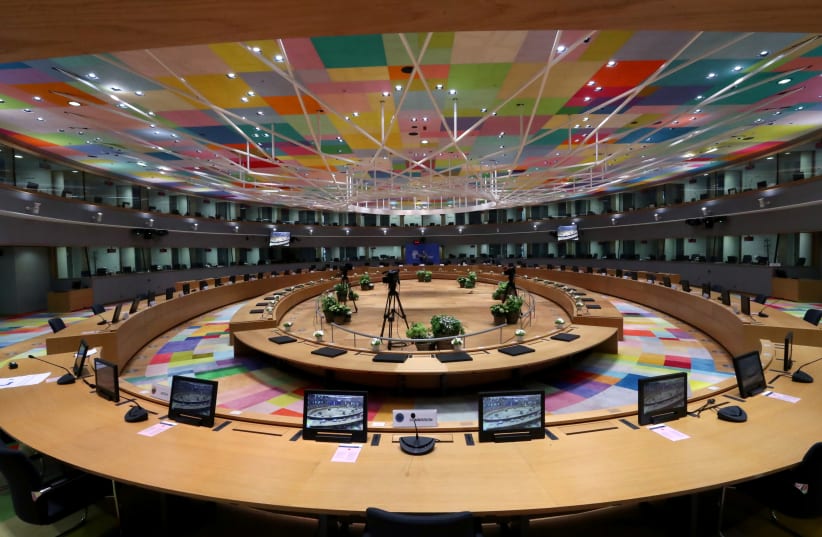The Simon Wiesenthal Center for over a year has acted in support of a Spanish Jewish employee, tenured since 1996 and now a senior official of the European Commission. In 2013, she was transferred to the EU diplomatic service, European External Action Service (EEAS), to work in the Middle East (Israel and Palestinian Territories).
One of her colleagues informed her that their Division Head allegedly suspected her of spying for the Mossad. She was thus transferred to the Turkish Division, entrusted with counterterrorism files.
According to her lawyers, then began a “slanderous... defamatory... campaign with antisemitic overtones.” She was again suspected of passing information to Turkish representatives. In 2016, she was dismissed “in the interest of this service.” Thus a long and painful process began.
The story appeared in last week’s Paris Match weekly (Belgian edition). The author, Frédéric Loore, gave the official an anonymous identity, the nom-de-plume of “Eva.” Loore suggested that his article was fit for the cover of a novel by John Le Carré.
He questioned: “Has the EEAS been infiltrated by a Mossad mole or have some of its managers engaged in harassment on the grounds of antisemitism? Was there a Mata Hari in the ranks of the service in charge of the European Union’s foreign and security policy? Or was it a fabricated plot to get rid of a cumbersome senior civil servant of Jewish descent?”
“Eva” had sought an investigation to find out on what these gratuitous accusations were based. “In the end, it was carried out only to harm me... After six years, they still refuse to tell me who accused me of these facts and on what basis,” the employee said.
Through 2017 to 2019, “Eva” was moved through other departments: Central America, Conflict Prevention and the Security and Peace Divisions.
Allegations of espionage did not appear in the EEAS Disciplinary Board investigation, rather only “statutory breaches”; “unjustified absences, acts of insubordination, refusal to submit to the hierarchy, refusal to perform certain tasks, unauthorized contacts and disclosure of nonpublic documents.”
Interestingly, the November 2014 and April 2019 reports added: “Ms. .... ’s career at the Commission and Council was already characterized by a history of difficulties with her superiors and a frequent refusal to follow instructions... serious difficulties were identified as early as her tenure at the Commission in 2005.”
Her lawyer questioned: “How is it possible that such an unmanageable person, who joined the service of the European Institutions in 1996, holding interim, temporary and auxiliary [posts]... appointed as a permanent official, can nevertheless not be trusted by her superiors, after entrusting her for 15 years with increasingly important posts in the Commission, Council and EEAS?”
ON MARCH 13, 2020, the Wiesenthal Center wrote to Ursula von der Leyen, president of the European Commission, on behalf of this longtime employee, repeating her “claims of antisemitism in a series of purported abusive mistreatment, detailed in a letter of her lawyers, addressed on 31 October 2019 to Federica Mogherini, former vice-president of the European Commission.” The employee was due to be fired on April 1, 2020.
Our letter received no response and was again mailed on May 14. This elicited a note on June 19 that the case was now in the hands of new Vice-President Josep Borrell and of Secretary-General of EEAS Helga Maria Schmidt. We were promised a “rapid response.” We are still waiting.
On July 24, a hearing was held in Spain, attended by her well-known Spanish lawyer, Baltasar Garzón. The employee and her Belgian lawyer, Eric Boigelot, could not attend due to the COVID-19 pandemic lockdown. The proceedings and investigation into “harassment and antisemitism” were unaddressed and the director for Human Resources claimed that he “knew nothing of a complaint of antisemitism.”
On August 26, it was announced that the employee would be fired on September 1. She was left with the cancellation of her medical insurance in the amid the COVID-19 pandemic.
A letter arrived on October 20 from EEAS Secretary-General Helga Maria Schmidt addressed to UNIA, a Belgian NGO presented as “The Interfederal Centre for Equality and the Struggle Against Racism and Discrimination”
The EEAS top official claimed that “this was not a case of discrimination. Officials of the European Communities Staff provide guarantees against discrimination, unequal treatment and intolerance in the workplace.”
Yet, a recent European Parliament report, “notes with concern the 135 mediation cases handled in 2018 in delegations and headquarters concerning unresolved disagreements over rights and obligations... including accusations of moral and sexual harassment.”
“‘Eva’ is case 136 and, apparently, not the only case of antisemitism. Another has come forward... This is reminiscent of a case, over a decade ago, at UNESCO in Paris, also suspected of spying for Mossad... The case was settled by the United Nations with appropriate damages.”
Around the same time, a number of Paris-based bank and other employees never revealed their Jewish identity. These “Marranos” (hidden Jews) would meet in a synagogue on Shabbat and tell me stories of their non-Jewish colleagues’ torrent of Jew hatred. We hope that by now they have felt able to leave the closet.
Our “j’accuse for Eva” will be ultimately resolved. Our Center will be there for other future victims.
The writer is director for International Relations of the Simon Wiesenthal Center.
